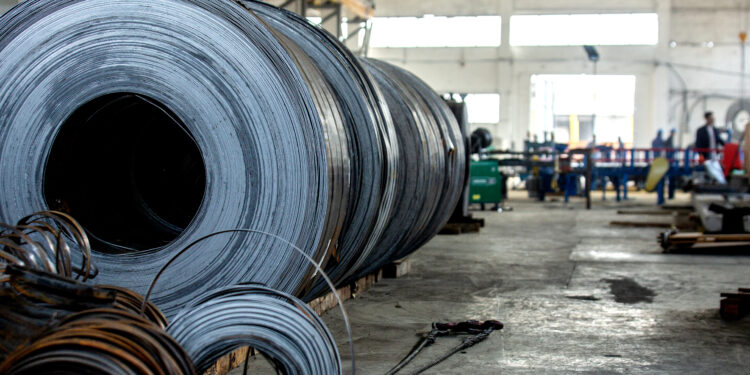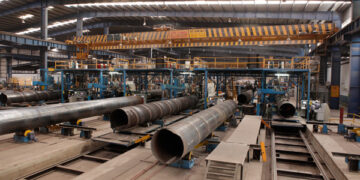RHI MAGNESITA INDIA LIMITED
Know the Company
RHI Magnesita India Ltd (RHIM) is a leading global provider of top quality refractory products and solutions for high-temperature processes surpassing 1,200°C used across diverse industries such as steel, cement, non-ferrous metals, and glass furnaces. In 2013, Australia based RHI AG acquired 69.6% of the share capital of Indian refractory company, Orient Refractories Ltd, thus making it a subsidiary of the global refractory company. In 2021, RHI AG had merged its two unlisted Indian entities named – RHI Clasil Pvt Ltd and RHI India Pvt Ltd with itself, resulting in the formation of the new amalgamated company renamed as RHI Magnesita India Ltd. RHIM’s extensive range of products includes Magnesia and Alumina-based bricks and mixes tailored for major industrial clients, alongside specialized refractory offerings like Isostatic products and Slide Gates.
In the last fiscal year, RHIM had completed two significant acquisitions in the refractory sector in India. The first acquisition was involved the Indian refractory business of Dalmia Bharat Refractories Limited, which completed in January 2023 through a share swap arrangement. The second acquisition entailed Hi-Tech Chemicals’ refractory business, concluded in January 2023 via a slump sale, maintaining its operational continuity.
Manufacturing facilities and Key Product Portfolio
With the last years acquisitions, RHIM India now operates through a network of nine state-of-the-art manufacturing facilities strategically located across the country serving the customers with speed, efficiency and reliability. RHIM’s manufacturing facilities are situated at:
1.Bhiwadi – Flow Control, Purge Plugs, Alumina Mixes
2.Rajgangpur – Flow Control, Basic Bricks, Alumina Bricks, Alumina Mixes, Silica Bricks, Purge Plugs, Lances
3.Jamshedpur – Flow Control, Tap Hole Clay, Darts, Pretap Plugs
4.Visakhapatnam – Alumina Mixes, Fired Alumina Bricks, Precast
5.Dalmiapuram – Alumina Mixes, Alumina Bricks
6.Bhilai – Lances
7.Khambhalia – Alumina Mixes, Fired Alumina Bricks
8.Cuttack – Unfired Basic Bricks
9.Katni – Alumina Mixes (Advanced Monolithics)
RHI Magnesita serves customers in India and more than 75 countries across the globe. Refractories for the Steel segment contributes major part of the company’s revenue. The Company has a strong focus on R&D with a world-class research facility in Bhiwadi which enjoys the support from the global R&D and technical expertise and experience of its parent company. RHIM R&D is focused on customization of products and services as per customer need, with ongoing innovation and refinement.
Strength
The acquisitions have resulted in RHI Magnesita India’s production capacity surpassing 500,000 tons per annum. Consequently, the company has fortified its position as the leading refractory player in India, offering an unparalleled product range, extensive plant footprint, and improved ability to serve customers throughout India, as well as in the broader regions of West Asia and Africa. The acquisition of Dalmia Bharat Refractories business has provided a well-distributed footprint, comprising five plants in eastern, western, and southern India, complemented by a robust product portfolio catering to cement and other non-steel industries. It also benefits from cross-selling opportunities and enhanced cost efficiencies derived from fixed cost optimization, resource bundling, and economies of scale.
RHIM has an advantage of strong brand reputation, industry relationships, and technical expertise of the global RHI Magnesita group. The global group has a legacy of almost 190 years in refractories business and maintains a presence in over 125 countries. Leveraging the resources of the global RHI Magnesita group, RHIM has established a robust operational platform that enables efficient and effective service delivery to customers.
Following the integration of Indian subsidiaries of the global RHI Magnesita group with orient refractories, and the subsequent acquisition of two leading refractory companies in India, RHIM has consolidated its position as a premier manufacturer and supplier of high-grade refractory products and solutions in India. With an augmented manufacturing capacity and a broad customer base across industries including steel, cement, lime, non-ferrous metals, and glass, RHIM is strategically positioned to seize significant growth opportunities within the Indian refractory market.
RHIM’s unique business model sets it apart with a diverse range of refractory products and services tailored to major customer industries in India. Unlike competitors that specialize in specific product ranges or customer segments, RHIM offers a “one-stop solution” for the refractory segment, leveraging the company’s capabilities extending from innovation and R&D capacities.
RHIM’s R&D activities are primarily conducted at its dedicated center in Bhiwadi, Rajasthan. R&D is a key focus area for RHIM as it endeavors to develop optimized and tailored products and solutions to meet the diverse requirements of its customers. Through ongoing R&D initiatives and leveraging the global R&D expertise and technical experience of the parent company, RHIM aims to enhance customer satisfaction, drive product quality improvements, and maintain a competitive edge in the market.
RHIM has nine refractory manufacturing facilities, which are strategically located across key steel and cement producing clusters across India. The facilities have state-of-the-art machinery and employ modern automation technologies to ensure the production of high-quality refractories.
RHIM’s strength lies majorly in brand reputation, operational platform, market positioning, product portfolio, R&D capabilities, and manufacturing capacity solidify its position as a trusted leader in the refractory industry. With a strong foothold in the fast-growing Indian market and a steadfast commitment to innovation and sustainability, RHIM continues to set the benchmark for excellence in the industry.
Strategic Acquisitions
RHIM aims to leverage the acquisitions of the Indian refractory business of Dalmia Bharat Refractories and the refractory business of Hi-Tech Chemicals to establish an undisputed leadership position in the industry. By amalgamating the acquired businesses’ local expertise with the support of the global RHI Magnesita group, RHIM seeks to optimize manufacturing operations, reduce import-related expenses, and broaden its product range. Cross-selling and upselling opportunities also increases market share in both domestic and export markets.
Opportunities
RHIM holds a prominent position in its sector both domestically and globally, establishing a robust global presence that enhances its competitive advantage. Particularly after integrating the Indian refractory business of Dalmia Bharat and the refractory business of Hi-Tech Chemicals, the company boasts a diverse range of products, enabling it to effectively cater to a wide array of end applications. This versatility enhances the company’s ability to meet the specific needs of various industries. The user industries in the domestic market, such as steel and cement, are currently experiencing substantial growth. This positive trend creates a conducive environment for RHIM to capitalize on the increasing demand for refractory products, positioning the company for expanded market share and enhanced profitability.
Financials
In the Q3FY24, on Y-o-Y basis RHIM’s consolidated results reflect a 43% revenue growth driven by substantial 58% increase in shipments, primarily mirroring the benefits from its recently acquired businesses. However, its EBITDA margin declined 2.2% to 12.8%, mainly due to 4.6% rise in employee-related expenses, and 3.1% increase in other expenses attributed to increase in shared services setup costs, legal and professional fees and travel. On a positive note, there was a 6.1% decrease in material costs, which partially offsets these impacts. Though, impairment of investment in a subsidiary and cost of integration of the two new acquisitions adversely affected the net profit, which is expected to be of one-time in nature. Net profit for the Q3FY24 stood at Rs 51 crore as against Rs 58 crore in the same quarter of the previous FY.
RHIM has posted a consolidated loss of Rs 678.90 crore during March FY23 quarter, on account of significant rise in expenses related to the acquisition of Dalmia OCL and Hi-Tech Chemicals, which was a one-time in nature.
Balance Sheet
Despite recent acquisitions and expansions, RHIM has been able to maintain its debt levels at Rs. 461 crore as of December 2023. This primarily consists of external commercial borrowings amounting to €33 million, with the remainder being working capital debt, contrasting against a net cash reserve of Rs. 43.1 crore. The company is effectively utilizing its cash reserves towards working capital and capital expenditures.
Risk Factors
The Company operates in a highly competitive market and faces competition from other established global refractory players. Maintaining market share and profitability may be challenging in the face of aggressive competition, necessitating the Company to continually innovate and differentiate itself.
The business environment is susceptible to macroeconomic fluctuations and policy changes that may affect the refractory industry. Unforeseen economic downturns, alterations in government regulations, or geopolitical instability could present risks and potentially disrupt business operations.
The volatility of raw material prices is also a concern for the company, as RHIM heavily relies on materials such as magnesite and alumina, whose prices can be highly volatile. Fluctuations in raw material prices have the potential to impact the company’s cost structure, profitability, and competitive pricing strategies.
Outlook
Refractory products manufactured by RHIM find primary application in high-temperature manufacturing processes within industries such as iron and steel, non-ferrous metals, cement, glass, petrochemicals, and energy. However, the demand for refractories is closely linked to the production of steel and cement, as both of these industries together contribute to over 90% of the company’s product demand.
India is currently the world’s second-largest producer of crude steel. Refractory consumption in the steel and cement industries has increased in India, thanks to consistent and robust growth in production, driven by the Make-in-India initiative. Additionally, government support for products through Atmanirbhar Bharat has bolstered production across various industries. According to CRISIL research, demand for refractories from the steel industry constituted 70% during the FY 2022-23. Looking ahead, the outlook for the refractory industry appears strong, with significant investments and capacity expansions expected in end-user industries such as steel and cement supported by Multiple factors, such as the government’s PLI scheme, the ongoing consolidation of the steel industry, implementation of the PM Gati Shakti Yojna and PM Awas Yojana, the emergence of the EV market in the automobile segment, and the broader infrastructure push by the government through the National Infrastructure Pipeline, are expected to drive growth in the steel industry.


















